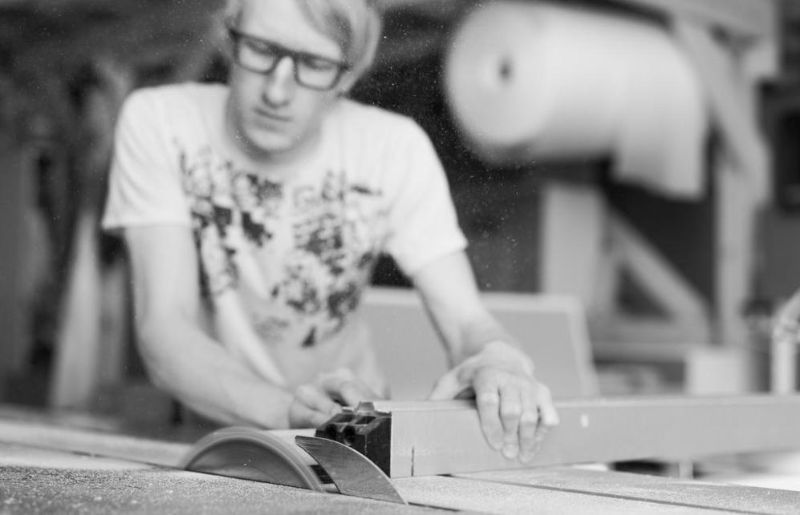Fine woodworker
"The best part of my work is physicality, variability and independence. My work is not excessively heavy, especially when I am allowed to work indoors and use machines to help, but it keeps me in good condition. During the working day, I can listen to 3-4 hours of audio books and podcasts."

- Tuukka Virkkilä
- Entrepreneur at Arrakosken Uni Oy.
- Graduated as a cabinet maker from Ikaalinen College of Crafts and Design.
- 14 years of work experience in the field.
Briefly explain what you do for a living.
I am a professional cabinet maker who manufactures beds and bedside tables from solid wood for consumers. I work as a solo entrepreneur in a company that customers know as Nukkuville. In addition to workshop work, my daily life as an entrepreneur includes sales, marketing, serving dealers, as well as customer service.
How have you ended up in the profession of your choice?
After upper secondary school, I spent a gap year and worked at a construction site. There, colleagues suggested that you should not stay in the construction industry for the rest of your life. However, I did not immediately know where I would apply to study. During the gap year, I ran into an old friend who studied as a cabinet maker at Ikaalinen College of Crafts and Design. I became excited about his stories and realised that I could live near school on our family farm, which was empty, if I got a study place in Ikaalinen. It was then the idea took off.
Describe your typical working day or week.
Between 9:00 and 12:00 is workshop time, so I make beds. Between 12:00 to 13:00, I do office work, for example, reply to e-mails. At the same time, the store is open for customers for one hour. After that, I will have a lunch break, after which I will continue in the workshop until about 6 p.m. Every other Thursday, I make deliveries to Helsinki area, which means I am working late until the evening.
What kind of work environment or working hours do you have?
I mainly work in the workshop and somewhat in the office and in the car. In my work environment, I have to tolerate wood dust and various noises from machines needed for work every day. In a small company, I have to make some heavy lifting alone when moving finished products for transport. In workshop work, I can use a forklift and various lifts.
As a solo entrepreneur, working hours can be defined very freely. There is some travel and weekend work, but I can also influence their schedules.
What kind of competence or qualities are required in the profession?
In the carpentry profession, your own precision affects several later work stages. If you damage the timber already when you bring it up for working, the error you made will be retaliated later. For example, a surface handler working with you, may need to do more work to cover up the error made at the initial stage.
The training descriptions of cabinet making often emphasise three-dimensional perception, but I think that it is emphasised excessively. The need for 3D perception depends on what kind of products you produce. For example, in my opinion, there is little need for it in the production of beds, but if you make stairs as a measurement order in different spaces, a good 3D perception will make your work much easier.
What is the best thing about your profession?
The best part of my work is physicality, variability and independence. My work is not excessively heavy, especially when I am allowed to work indoors and use machines to help, but it keeps me in good condition. During the working day, I can listen to 3-4 hours of audio books and podcasts.
What are the downsides of the profession or what seems challenging?
The work of a cabinet maker has many different areas that should be mastered. Comprehensive management of the skills required by the profession requires years of versatile work experience.
What would you tell a person considering the profession of a fine woodworker?
During the studies, you should learn to use different machines or at least try them open-mindedly. It may not be possible to access a wide range of machines in working life. If the educational institution provides the opportunity to practise using the machines in the evening, I recommend taking advantage of the opportunity.
With regard to employment, I would say that there are roughly three options. The first is establishing your own company. As an entrepreneur, you manage the entire operation. Another option is to work in a small company where working is entrepreneur-like. You get a lot of responsibility and varying tasks, but someone else bears the financial responsibility. The third option is factory work, where you produce one part hundreds or thousands of times a day, in series production. The next day, maybe another part.
Finally, I would advise you not to think that you must continue from upper secondary school to higher education. Handicrafts are not taught as much at a university of applied sciences as at a vocational school. I myself have completed upper secondary school and vocational education, as well as work training in the United States. Without all these steps, I doubt I would have become an entrepreneur.
How do you see the future of your profession?
CNC technology will significantly change the sector in the future. In simple terms, this means that when a table is manufactured, 3D modelling is done first. Based on the model, the machine cuts the piece. Using CNC technology requires creative thinking. You must be able to understand how the piece is attached to the machine, and how and in what order the machine is working on the piece. Work that requires creativity cannot be done by a machine; it needs people.
Photo: Maru Lemmetty
